What I Learned Going Solo at UM Hackathon 2025?
One evening, I was just casually scrolling through Instagram, probably procrastinating like usual, when I stumbled across a story about UM Hackathon 2025. No huge hype, just a random post in the algorithm. I tapped through it, skimmed the details, and for some reason thought, “You know what, why not?” So I registered on impulse.
This was a bit of a shift for me. I’ve joined hackathons before—some with friends, some focused on data science—but this one stood out because you could join solo. That was new to me. And tempting. I had this internal itch: How far can I really push myself alone? I figured maybe this would be the time to find out.
So I signed up, no team, just me.
Domain Luck (Or Lack of It)
A few weeks later, the hackathon domains dropped. Turns out, we couldn’t pick our topic—we were randomly assigned. I landed in Domain 1: Enhancing Charity & Donation Through Fintech, with judging support from Securities Commission Malaysia.
Honestly, my first reaction? I’m so screwed.
This wasn’t just fintech—it was Islamic Social Finance, including things like Zakat, Shariah compliance, and transparency in charitable transactions. If you’ve ever been an applied math major who suddenly finds yourself neck-deep in unfamiliar Islamic finance terms, you’ll understand the panic.
But, I figured this was kind of the point. It’s called a hackathon for a reason.
So I spent the next few hours (probably 10+) going down the rabbit hole: Zakat, Waqf, Shariah principles, financial transparency frameworks in Malaysia. I didn’t become an expert, but I picked up enough context to start forming ideas.
From “Funding Societies” to ZakatDAO
The first idea I played with was something inspired by Funding Societies, a platform I’d invested a bit in before. It revolved around peer-to-peer financing, localized for Islamic finance. I thought it could be a cool angle.
I pitched it to a mentor from SC—Diyana—and her feedback was polite but pretty clear: the idea was decent, but not really innovative enough for this domain. Oh, and she was visibly surprised that I was competing alone. (Most teams had four to five members; I was one of the very few solo participants out of over 1,100 people.)
So I pivoted.
That’s when ZakatDAO came into the picture: a decentralized autonomous organization (DAO)-inspired approach to managing Zakat funds with transparent, on-chain governance. Think Ethereum-style transparency, but localized for Malaysia’s regulatory and religious landscape.
Did I have any actual blockchain experience? Nope. But I understood the concepts well enough to build a mock ledger, wire up a basic API, and frame it all within a workable prototype.

The live demo is here if you’re curious: https://zakatdao.onrender.com
And for the nerds, here’s the GitHub repo: https://github.com/JienWeng/ZakatDAO
The Slide Disaster
Fast-forward to presentation day. I was feeling ready—well, kinda ready.
I’d spent the night before rehearsing the pitch in my room, going over the key points, transitions, and making sure my timing stayed within the 5-minute limit. I even did a couple of dry runs on Microsoft Teams, screen-sharing just like I would during the real session. Everything seemed solid. The slides worked. The timing was tight but doable. My answers to anticipated questions? Not perfect, but I had reasonable responses lined up.
Then came the live pitch.
- I logged in early, did all the tech checks I could. Shared screen? ✔️
- Slides visible? ✔️
- Mic clear? ✔️
- Wi-Fi stable? ✔️ (or so I thought…)
The host called my name. It was go time.
The first few minute went smoothly—I introduced myself, set the context of the problem, and segued into the solution. I was getting into my rhythm. And then… disaster.
“Hi, sorry to interrupt—but your slides aren’t moving.”
One of the judges had their mic on, and I could hear the confusion in their voice.
I froze for a split second. My brain went into overdrive.
What? They’re not moving? But I’m already on slide 6!
I quickly checked my window. Sure enough, my presenter view had been moving along perfectly… on my side. But Teams was stuck on Slide 1 the whole time for the judges.
So for nearly two full minutes, I’d been talking about charts, flows, features, and UI wireframes that no one else could see.
Cue immediate internal panic.
I apologized, fumbled to stop sharing, reshared the window instead of the full screen, and checked with the panel: “Can you see it now?”
They nodded. “Yes, now it’s working.”
I had no idea how long the issue lasted. It could’ve been three slides, five, or all of them. But I didn’t have time to dwell. I was already behind on the clock, and I had to speed-run through the rest.
That’s where things started slipping. I rushed my explanation of the key architecture. Skimmed over the DAO mechanics that I had initially planned to highlight.
By the time I got to the Q&A, my head was still spinning. A judge asked about limitations of my solution, and I sort of… rambled. In hindsight, I knew the answers—I just couldn’t think clearly enough to package them well in the moment.
When it was all over, I closed my laptop and just sat there. Total silence. No more adrenaline. Just disappointment.I genuinely thought that was it.
I had three exams in the coming week, so I mentally shifted gears. I figured, “Okay, at least I learned something. Let’s move on. Time to study.”
And honestly? That would’ve been a fine ending. Not everything works out. Sometimes you prep and things still fall apart.
But then, something unexpected happened…
The Unexpected WhatsApp
So that night, I did what any student in my situation would do: I made myself a drink (just Milo, don’t worry), sat at my desk, and opened up my lecture notes.
The finalists announcement was happening live on MS Team, but I wasn’t really paying attention. I had the tab open on my browser, muted, just letting it run in the background while I was flipping through Kruskal-Wallis test.
Then my phone buzzed.
I ignored it at first—figured it was just a group chat meme or Shopee promo again—but then it buzzed again.
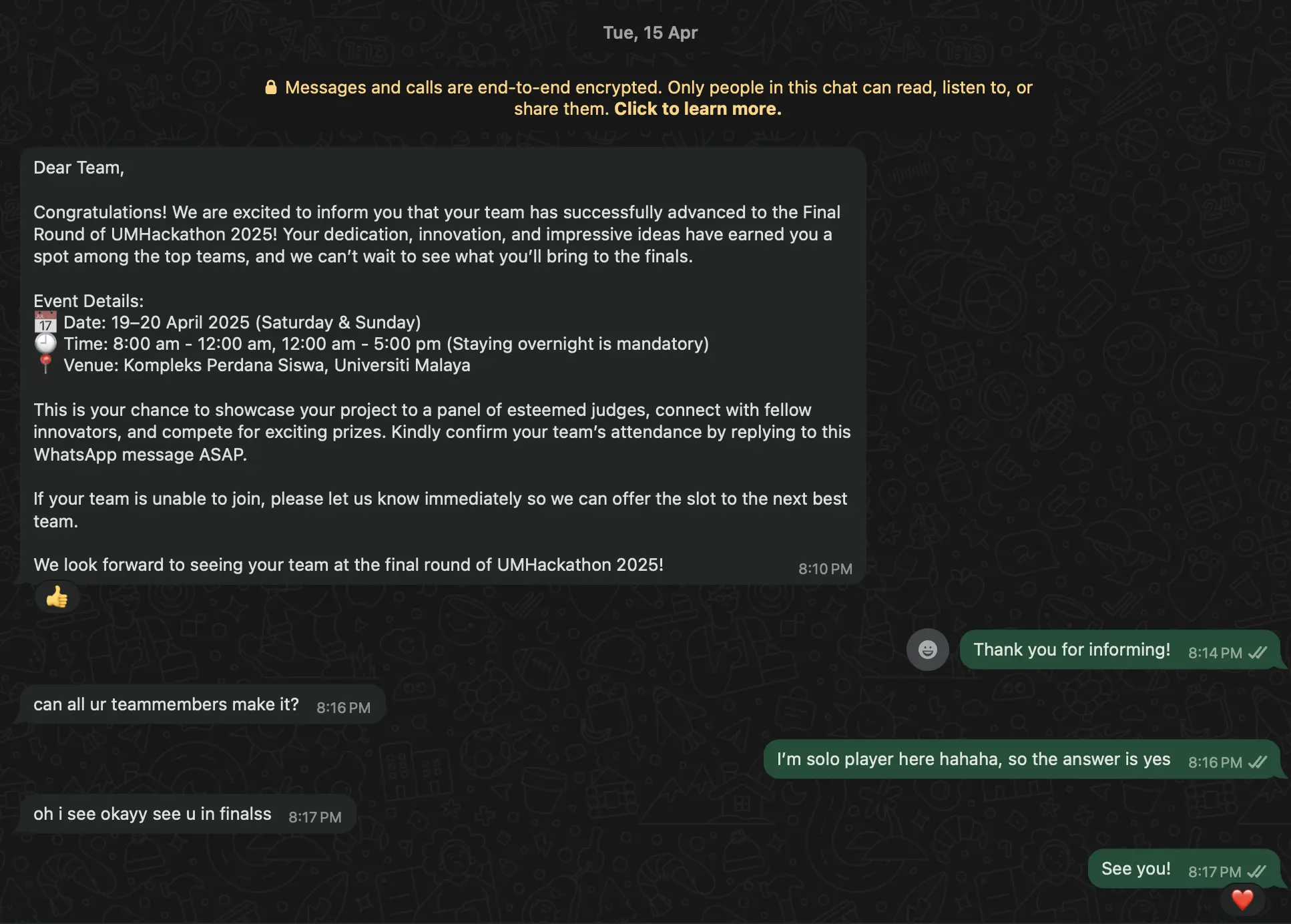
“Dear Team, congrats! ...”
Wait. What.
I re-read it three times. For a moment I just sat there blinking at the screen. Did they mean someone else? Maybe they mixed up the name?
Then I scrolled through the finalists announcement. Yup. There it was—my name, JienWeng, in the top 10. And then there was… me. Just this one-person gang.
Honestly, my first instinct was: Do I even have the bandwidth for this?
I had three tests in the next few days, I was already mentally checked out from the hackathon, and if I’m being really real—I was still a bit bruised from how the first pitch went.
But then I thought about it for a second longer. When else am I going to get a chance like this? How often do you get to say “Hey, I made top 10 in a national hackathon judged by the Securities Commission Malaysia… as a solo dev”?
So I told myself: Screw it. Let’s see how far this weird little one-man project can go. I packed up my bag, grabbed a sleeping bag, a pillow, my laptop, and enough clothes for 24 hours. I was going in. No team, no backup. Just vibes and stubborn me.
Final Round: Just Me, Myself, and My Sleeping Bag
So I arrived at Universiti Malaya, Petaling Jaya, the venue for the final round. It was this big, open space filled with banners, couple table with team names, and a low hum of concentrated stress. Everyone was already in their teams, sitting in circles with laptops out, discussing strategy, updating pitch decks, sharing snacks.
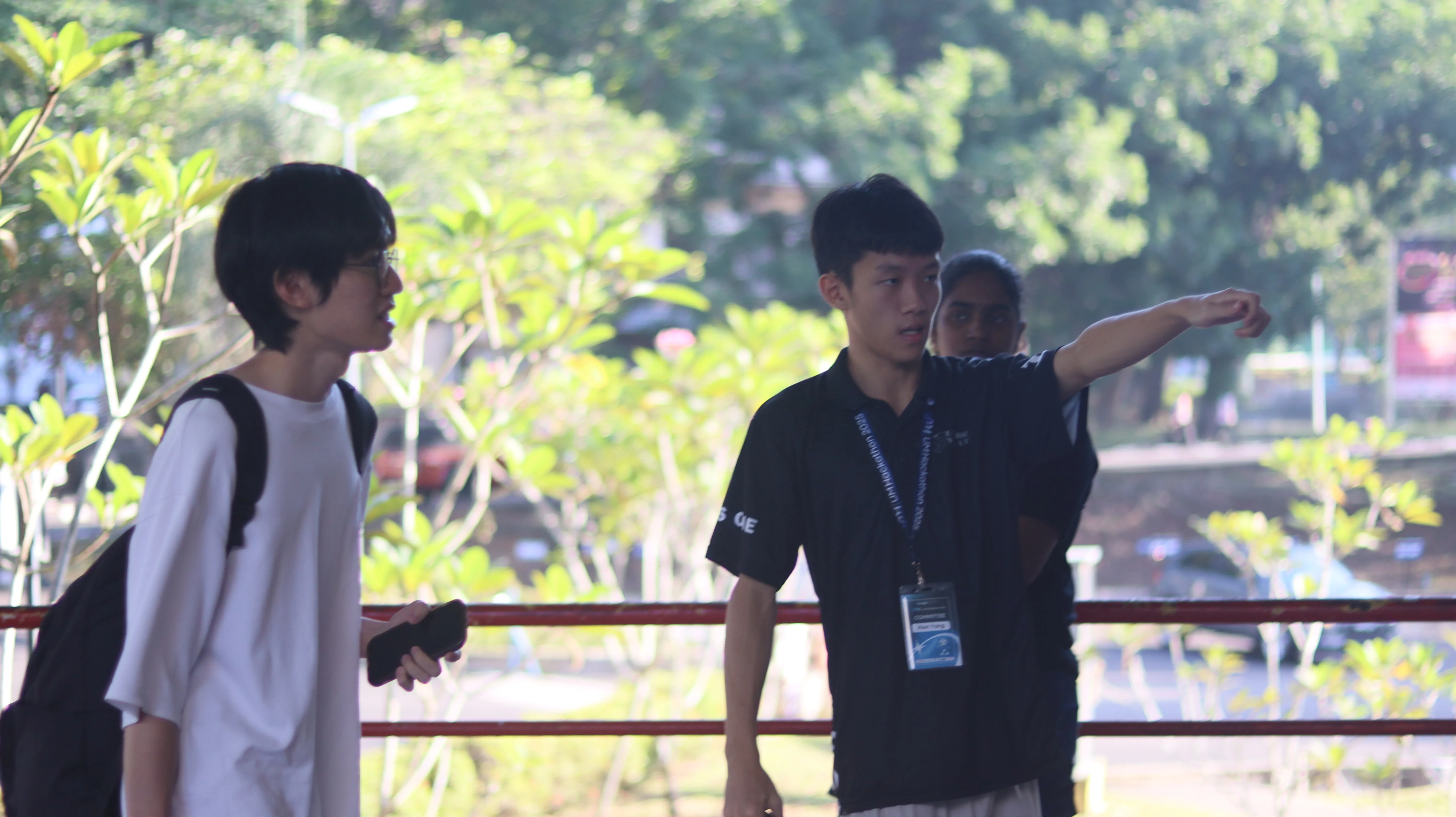
And then there was me. With my laptop, a pillow, and a sleeping bag.
People were… noticeably surprised.
Some thought I had gotten separated from my group. Others just stared for a second like “Wait, this guy came here alone?” One of the mix teams from UNITEN and UiTM even came up and asked, “Bro, where’s your team?” I smiled and said, “You’re looking at them.”
Three Mentors, Three Very Different Realities
I knew I had limited time and brain power, so I booked all three mentoring slots early.
And I’ll say this up front: getting three separate takes from three SC mentors in under 12 hours? That’s probably the most intense learning curve I’ve had outside of an exam week.
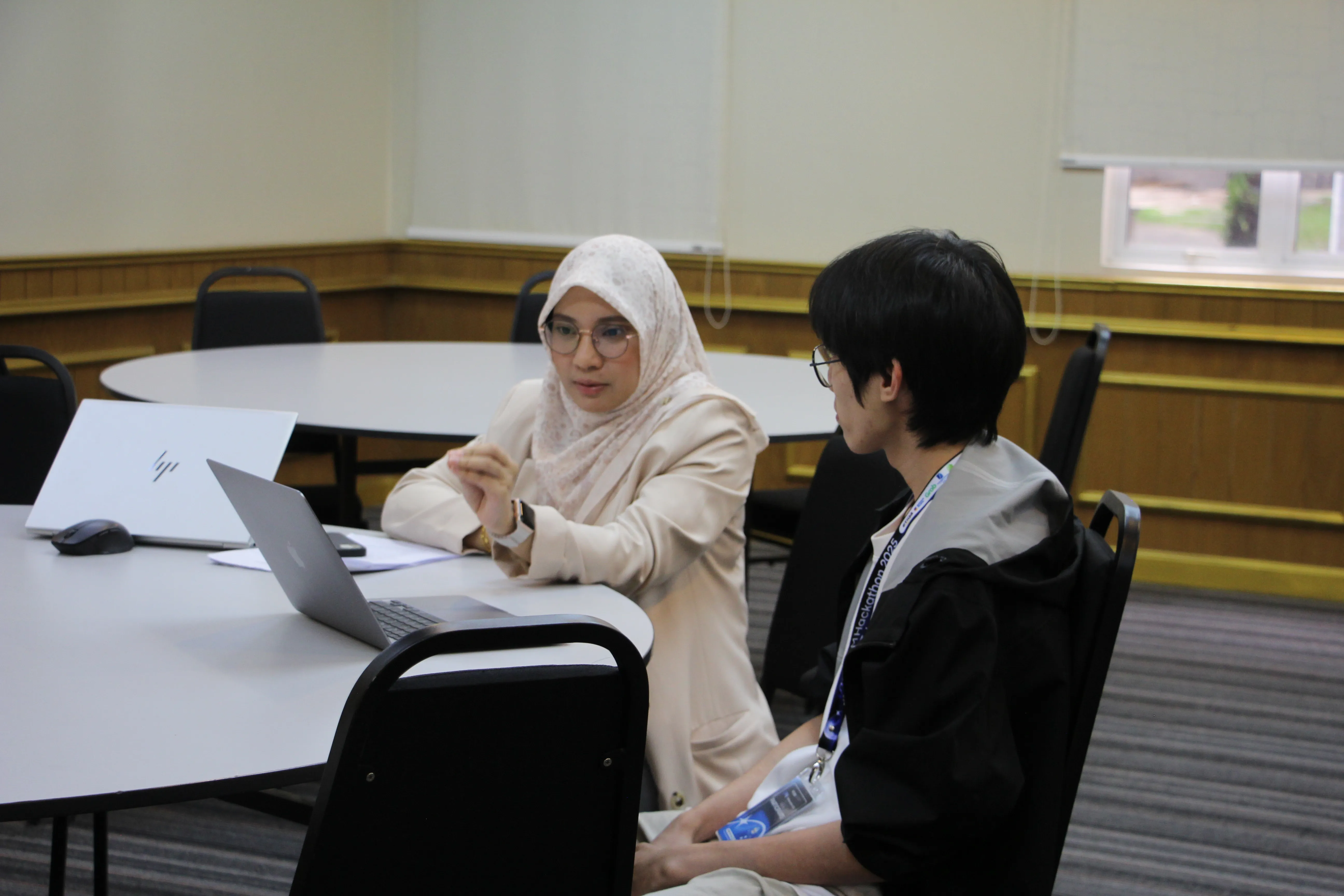
Each of them had a completely different emphasis:
- One mentor was super pragmatic—“You need more solid use cases. Your user flow is too conceptual.”
- Another was fascinated by the DAO idea, but skeptical of feasibility in Malaysia—“Zakat can’t be fully decentralized under current regulations. Think more hybrid.”
- The last one went deep into Shariah compliance and reminded me that the entire model of pooling and distributing funds must follow strict guidelines.
It was… a lot.
Honestly, it kind of threw me off. I wanted to incorporate everything they said, but there was no way I could redesign my system in a few hours, and I still had to prep for my final presentation. I took notes, filtered through what I thought was most relevant, and made small but intentional changes: clearer user flow, sharper explanations of blockchain use, more realistic discussion of regulation.
24 Hours Isn’t a Lot
To be very clear—doing a 24-hour hackathon alone is insane.
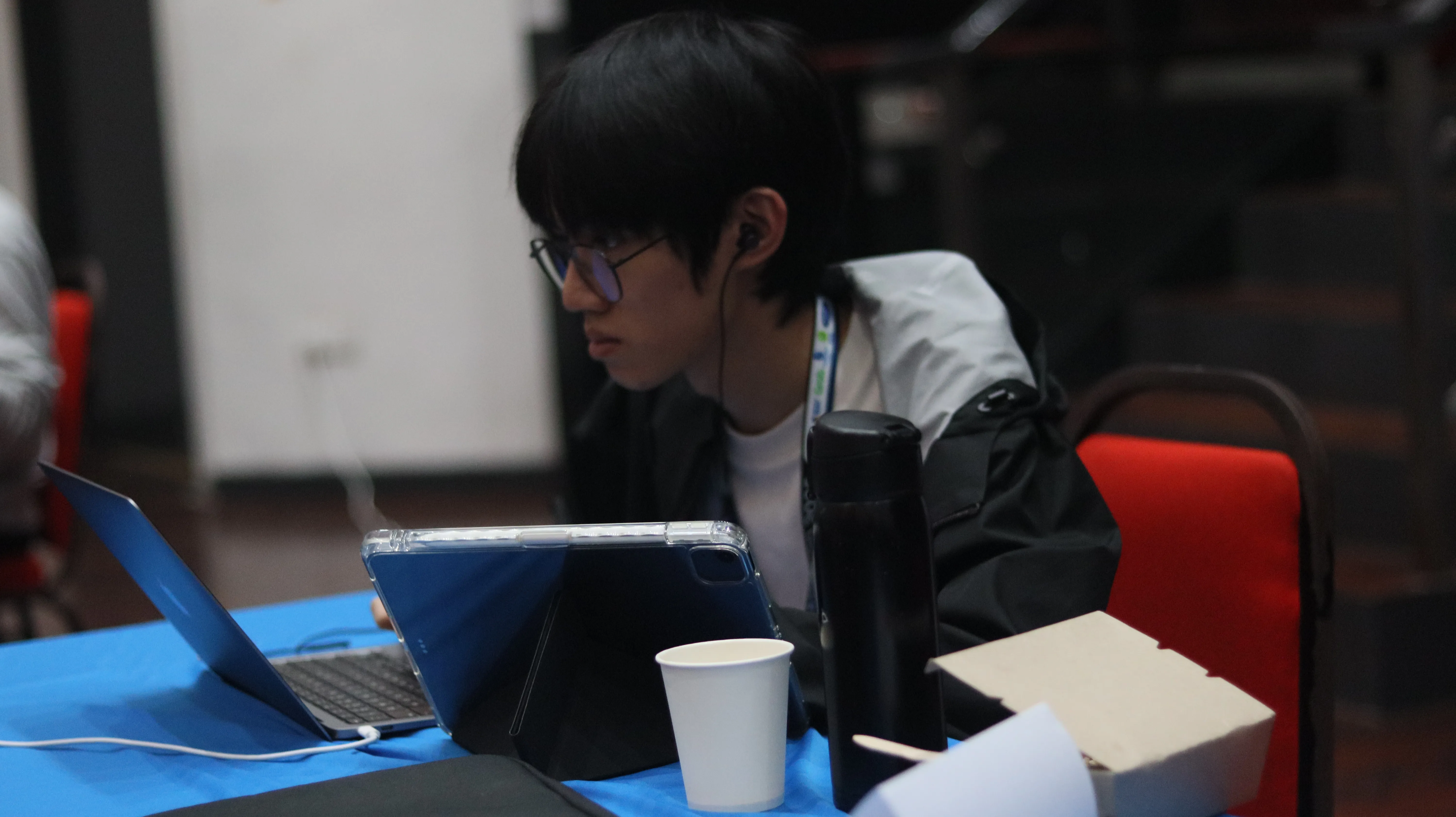
There’s ideation, technical refinement, front-end polishing, pitch deck writing, and then pitch practicing. I didn’t have a team to delegate. Every single task came down to me.
I barely had time to code, let alone perfect. I mocked a simplified blockchain ledger (linking below if you’re curious), cleaned up the frontend just enough to not embarrass myself, and rewrote my pitch script around 3AM. Then I crashed.
And yes, I actually slept. 6.5 glorious hours in my sleeping bag, surrounded by people who only power-napped for less than 1 hour.
The next morning, one of the UITM teams from Johor poked fun at me:
“Bro you tidur paling awal, paling lama.”
What can I say? I believe in REM cycles before React components.
Final Presentation: Round Two
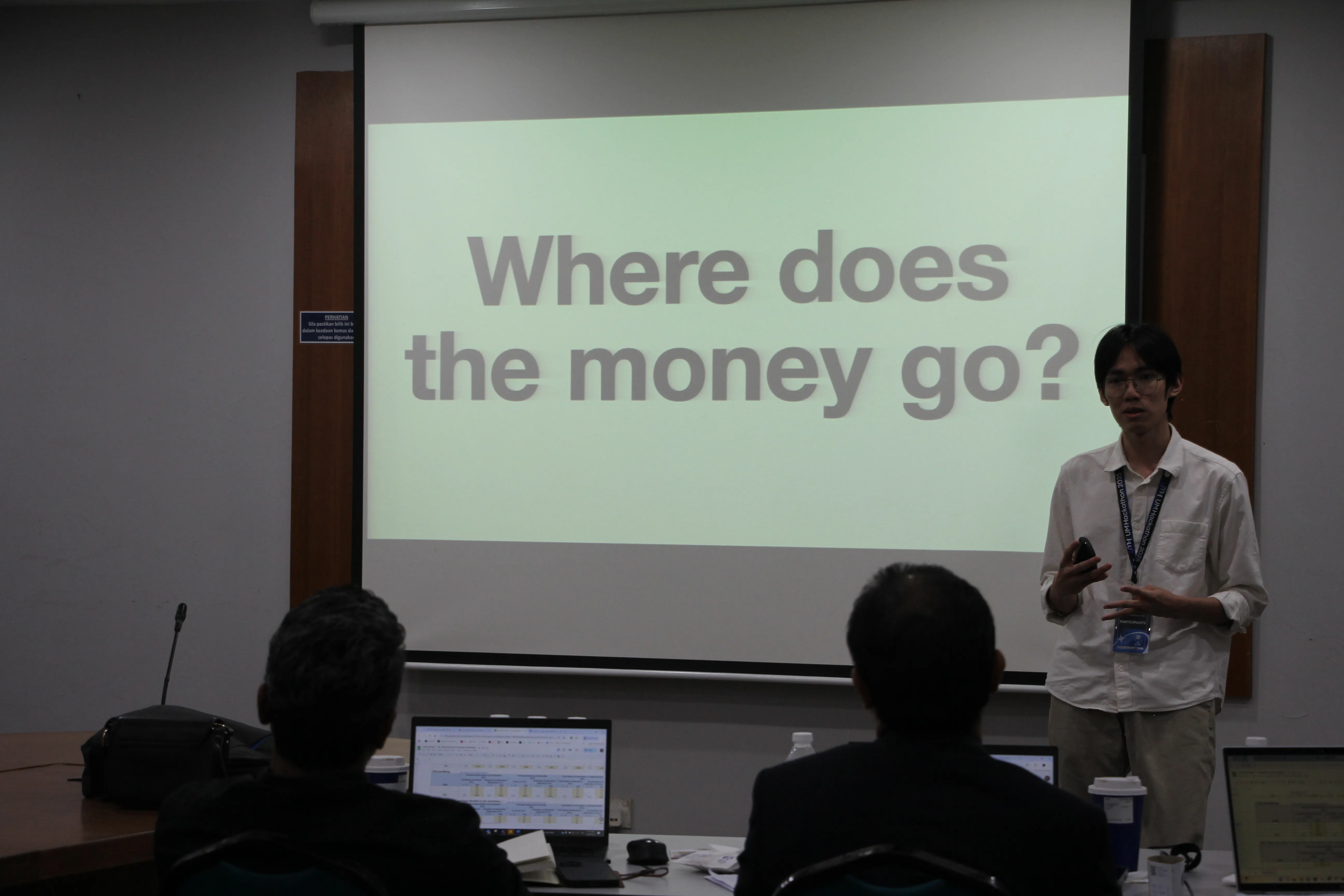
By now, I was calmer. I had been through a disaster once, and frankly, what’s the worst that could happen now? I wore my “formal” shirt—which was really just the cleanest collared shirt I had—and stepped up.
This time, slides worked. The storytelling flowed better. And I remembered to breathe during Q&A.
No, it wasn’t perfect. I still stumbled a bit explaining the regulatory boundaries of DAO in Malaysia. But I showed up. I told the story. And I answered every question the best I could with the prep I had.
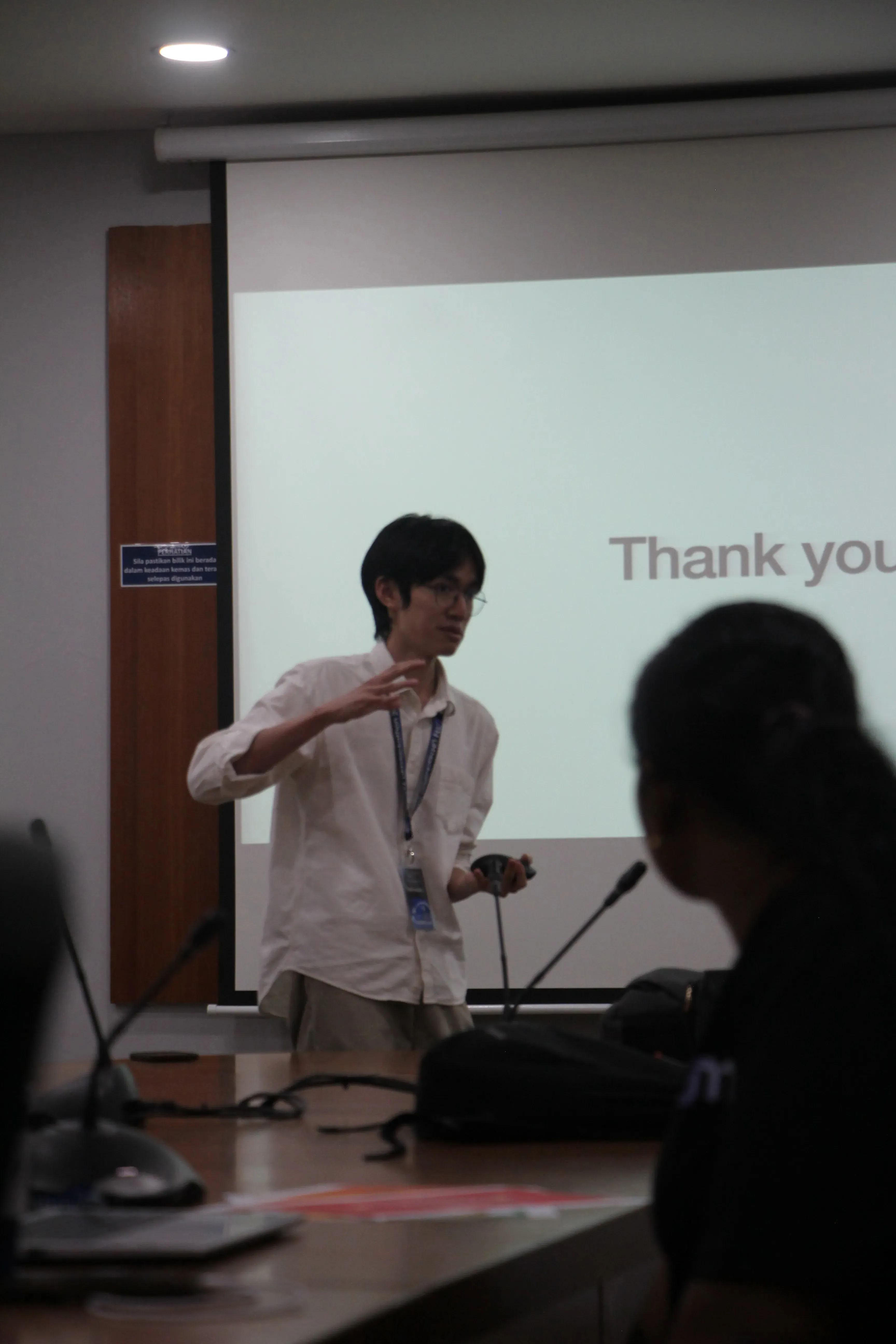
When it was done, I sat back, had some water, and just… exhaled.
Whatever the result, I felt I had pushed myself further than I ever had in a hackathon—technically, emotionally, and mentally.
Ending
When we reached the closing ceremony, I was honestly just glad everything was over.
I was sitting there in the hall, exhausted but relieved. Everyone around me was in clusters—teams talking, some still tweaking slides just in case. I sat alone, trying to stay calm, still half-processing how far this solo journey had brought me. But in the back of my head, I kept thinking: They’re all so good. Could I really have a shot? These were full teams, many from strong tech and business backgrounds, and I was just… one guy with a math degree and some stubborn curiosity.
And that’s when I mentally let go of the outcome. It’s fine, I told myself. There’s no way. I was already proud of the prototype, the effort, and everything I learned from the mentors. I even had three tests coming up the following week—I was ready to mentally clock out and switch back to uni mode.
But then they said it.
“4th Runner-Up, comes from team... No, I should say it is a team, I should announce it as the person, let's congratulate the only solo participant here! Team JienWeng!!!”
I froze for a second. Then I walked up. And this part, honestly, felt surreal.
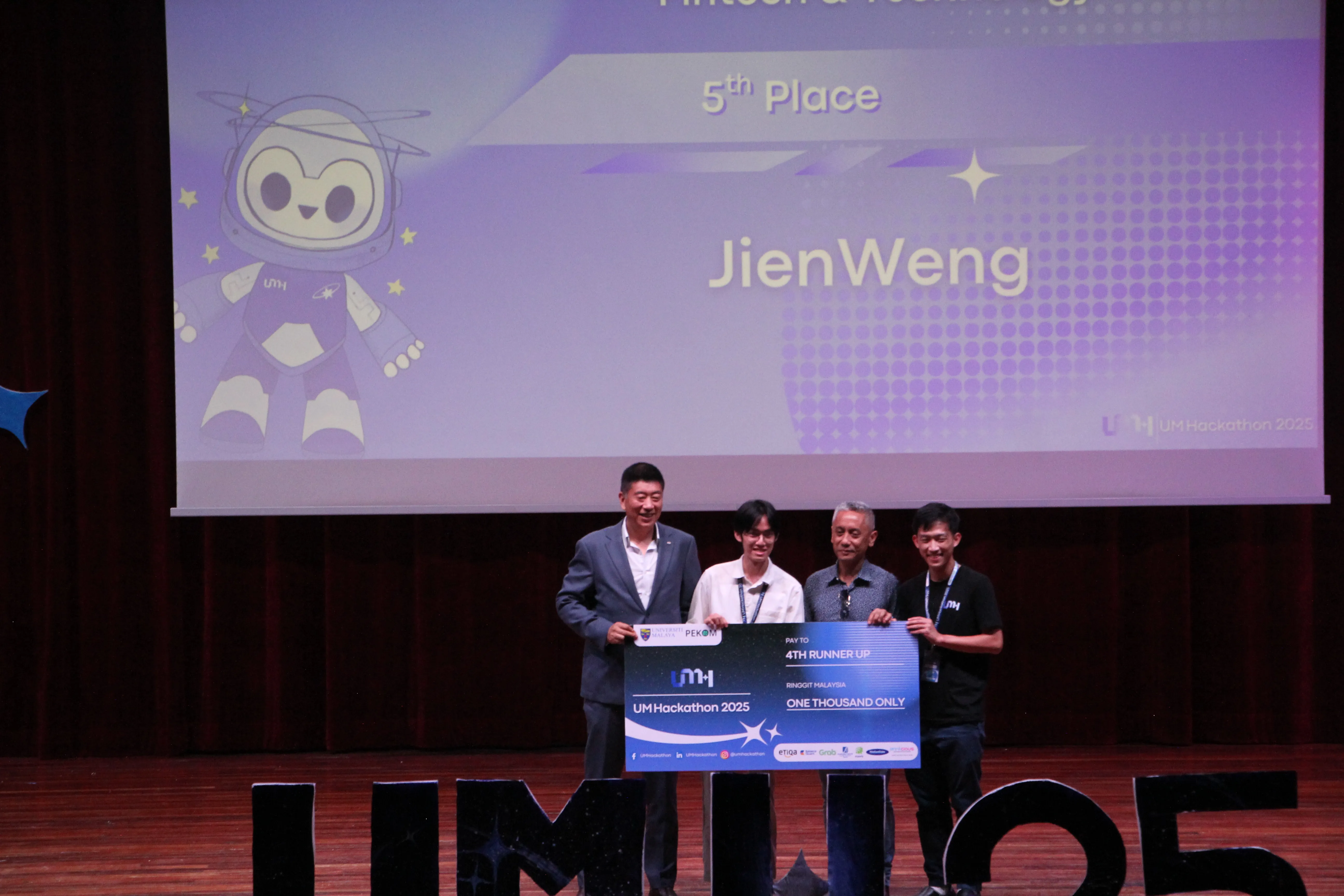
I was the only solo participant to reach the finals in the entire competition across all domains—out of over 267 teamsand more than 1,100 participants. And when I went up to collect the prize, I swear I got the loudest applause of the night. Maybe it was because I was the first one called. Maybe it was the underdog thing. Or maybe people just liked seeing someone go all in, solo.
Either way, that one moment hit hard.
It’s easy to reduce it to just: “Cool, you got RM1,000.” But it wasn’t about the money. It was the validation that even if your deck didn’t flow perfectly, even if you fumbled during Q&A, even if your tech stack was a little scrappy… your ideas could still resonate.
This was never about being the best coder in the room. It was about solving something real, or at least trying to. That was the goal—and I think I managed to stay true to that.
So, What Did I Take Away From All This?
Looking back, I think this whole UM Hackathon experience taught me far more than just how to throw together a fintech prototype or talk about Islamic social finance in front of judges. It taught me how to bet on myself—even when I feel underqualified, overwhelmed, or completely out of my element.
I walked in as a solo participant, a math student with zero formal background in finance or blockchain dev. I was literally Googling “what is Zakat” a few days before problem statements dropped. And yet, I came out with a working prototype, real feedback from industry mentors, and even a little prize money. Not bad for a guy who once panicked because his slides didn’t move.
But here’s what I think matters more than any trophy or certificate:
This hackathon made me feel something again about building.
That restless curiosity. That internal drive to figure things out even when you’re not sure how. That chaotic rush of shipping under pressure.
It reminded me that building stuff—even if it’s scrappy, incomplete, or slightly unrealistic—is still worth it. And that sometimes, having less support can make you go deeper in your own thinking.
I won’t lie: I still wonder if I should’ve formed a team. I could’ve produced more, slept less, maybe ranked higher. But I also think there’s something pure about doing one hackathon completely on your own. You learn a lot—about your limits, your blind spots, your weird panic habits (hello 3AM YouTube breaks), and your capacity to push through when it’s just you versus the clock.
TL;DR: Would I Do It Again?
Not alone—probably not.
Was it worth it? 1000%
And now that it’s all over, I’ve got a lot more clarity about where I want to go next:
- I want to get better at storytelling under pressure.
- And I want to take this ZakatDAO idea further—maybe not as a startup, but as a learning lab. A space where I explore ideas at the intersection of math, policy, and tech.
If you’ve ever thought about joining a hackathon and doubted yourself because you’re “just a student,” or not technical enough, or have no team—I hope this post gives you the nudge.
- Build anyway.
- Pitch anyway.
- Learn anyway.
And if the slides break again?
Well, now I know—I’ll bring printed flashcards.